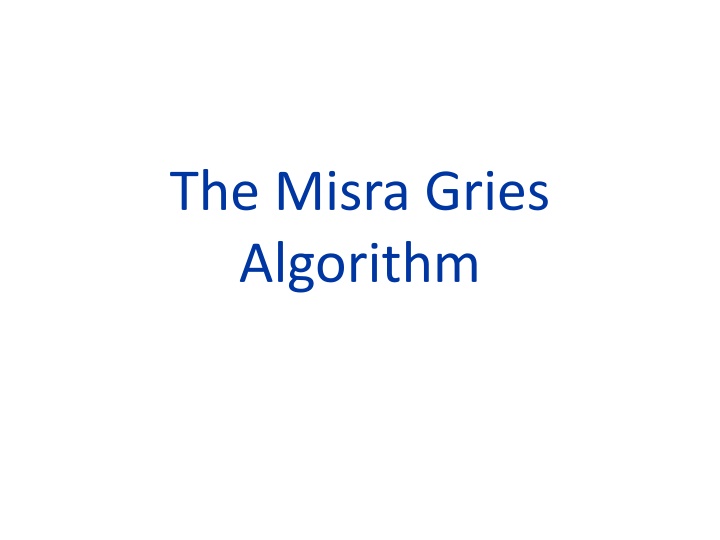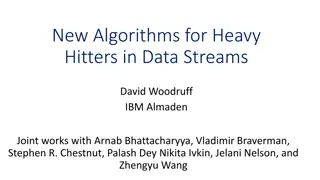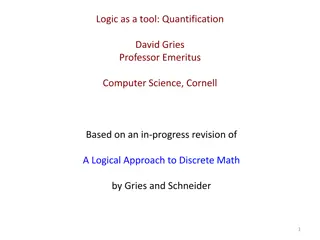
Algorithmic Data Streaming Techniques and Applications
Explore the Misra-Gries algorithm, motivations for monitoring data, dealing with limited space, and efficient data stream management. Discover streaming algorithms like Rabin-Karp for text processing and the importance of approximation in algorithm quality.
Download Presentation

Please find below an Image/Link to download the presentation.
The content on the website is provided AS IS for your information and personal use only. It may not be sold, licensed, or shared on other websites without obtaining consent from the author. If you encounter any issues during the download, it is possible that the publisher has removed the file from their server.
You are allowed to download the files provided on this website for personal or commercial use, subject to the condition that they are used lawfully. All files are the property of their respective owners.
The content on the website is provided AS IS for your information and personal use only. It may not be sold, licensed, or shared on other websites without obtaining consent from the author.
E N D
Presentation Transcript
The Misra Gries Algorithm
Motivation Espionage The rest we monitor
Motivation Viruses and malware
Motivation Monitoring internet traffic
Problem 250BPS 250 BPS We can't store the whole input so We seek methods which requires small space
Synopsis (Summary) Structures A small summary of a large data set that (approximately) captures some statistics/properties we are interested in. Synopsis d Data Set D
Synopsis: Desired Properties Easy to add an element Mergeable : can create summary of union from summaries of data sets Easy to delete elements Flexible: supports multiple types of queries
What can we do easily? 32, 112, 14, 9, 37, 83, 115, 2,
What can not be done easily? Compute median.
In Pattern Matching Pattern P is given. Text T streams in. Dueling algorithm, FFT - not streaming algorithms. KMP ? Needs O(|P|) space. (good) May work O(|P|) time on every token. (not so good)
BUT Rabin-Karp Algorithm - streaming algorithm. Needs O(1) space. (excellent!) Works O(1) time on every token. (excellent!) But result only good with high probability!
The Quality of an Algorithms Answer Quality of approximation Probability of result
The Quality of an Algorithms Answer Quality of approximation Probability of result
Frequent Items: Exact Solution 32, 12, 14, 32,7, 12, 32, 7, 6, 12, 4, Exact solution: Create a counter for each distinct token on its first occurrence When processing a token, increment the counter 14 7 6 4 12 32
Deterministic Streaming Algorithm for Finding Frequent Items The Misra-Gries algorithm [1982] finds these frequent elements deterministically, using O(c log m) bits, in two passes.
Frequent Elements: Misra Gries 1982 32, 12, 14, 32,7, 12, 32, 7, 6, 12, 4, 12 14 12 7 12 4 32
Frequent Elements: Misra Gries 1982 32, 12, 14, 32,7, 12, 32, 7, 6, 12, 4, This is clearly an under-estimate. What can we say precisely?
Algorithm Analysis Space: c counters of log m + log n bits, i.e. O(c(log m + log n)) Time: O(log c) per token. Output quality?
Algorithm Analysis Let ?? be the frequency of key j. ?? be the value of the counter for j at the end of the algorithm. Claim: ?? ? ? ?? ??.
Proof Clearly ?? ??. For the other side: Consider every time that counterjis decremented. c other counters are also decremented at that point. It means that there were c times that other keys thanjwere encountered, for each such decrement.
Proof Consequently: There are no more than ? such decrements, or ?? ? ? ? ??. Conclude: The counter of any key whose frequency is more than ? the query. ? times is non zero at the time of
Finding Frequent Elements How do we verify that all elements in the counters are frequent? -- Another pass.




